
The Rev. H.K. Matthews, front row, second from left, and John Kirtley, front row, far left, joined more than 6,000 marchers at a 2010 Tallahassee rally to support expanding the income-based Florida Tax Credit Scholarship Program.
By John Kirtley
The Rev. H.K. Matthews passed away Monday at the age of 97. As I urge you to read in this obituary, he was one of the towering figures in the Florida civil rights movement.
He was arrested over 30 times fighting for equal rights in Northwest Florida. He was beaten, along with John Lewis and other brave activists, on the Edmund Pettus Bridge in their first attempt to march from Selma to Montgomery. There is now a park named in his honor in Pensacola. You can also read his autobiography, “Victory After The Fall.”.
On a 2010 visit to Pensacola to recruit schools for the Florida Tax Credit Scholarship program, former Step Up For Students grassroots organizer Michael Benjamin and I met the operator of a faith-based school in town. He urged us to meet with Rev. Matthews, who he thought might respond well to the social justice message of the scholarship program. At the time, the average household income of our students was less than $30,000, and 75% were minorities. Michael and I said we would love to meet him.
Rev. Matthews didn’t say much during our initial visit; Michael and I explained how the scholarship program empowered low-income families to choose a different school if the one they were assigned to wasn’t working for them. He seemed to just take it all in but offered neither affirmation nor disagreement.
Almost as an afterthought, I invited him to a march and rally we were having the next month in Tallahassee. We needed the legislature to pass a bill to expand the scholarship program to relieve our waitlist, and we asked scholarship families to come to the Capitol to show their support. To my surprise, he agreed to attend.
On that day, over 6,000 people marched from the convention center to the Capitol. I invited Rev. Matthews to walk in front of the crowd with other faith leaders. Normally I would never walk in the front row, but I wanted to make sure everything went smoothly for him. He was very quiet as the huge crowd marched.
When we had gathered for the rally in the Capitol, I placed him in a prominent seat on the stage. A few minutes into the event, he motioned me over and asked if he could speak to the crowd. I had no idea what he was going to say, but I wasn’t going to say no. I went to the minister running our show and asked him to introduce Rev. Matthews.
What would he say? Was he with us?
I soon had my answer.
“This reminds me of the old movement,” he said. “Seeing thousands walking in the streets, fighting for the right to determine their own future, to fight for what is best for their children. When I worked with Dr. King back in the day …”
When he said those words, there was a murmur in the crowd, both students and adults. These kids had read about Dr. King in their history books. Some of them knew that there were not one but two marches across the Pettus Bridge, and here was someone who was there at the first attempt, someone who took the blows.
He was indeed with us.
Immediately after the rally, Rev. Matthews was swarmed by students young and old, some asking questions about his time with Dr. King, some young ones who just wanted to touch him — I suppose just to make sure this hero was real. They did not let him go for at least 20 minutes.
I could tell at the time this moved him. He told me so later. After that day he would call me to ask if there was anything he could do to help the movement. We had him appear at events with donors, governors, and legislators.
He would lead another march for us in 2016, when over 10,000 people came to protest the lawsuit filed by the Florida teachers union demanding that the courts shut down the Tax Credit Scholarship, which would evict 80,000 poor kids from their schools. That day Rev. Matthews was joined at the front of the procession by Martin Luther King III, the son of the man Matthews marched with 50 years prior. You can watch a 60-second video of that march here.
I had the pleasure of joining him at his church in Brewton, Alabama, where he moved in later years. He was being honored for his years of service to that church. I was honored, though very surprised, when he called me up to speak that day. Luckily, the words to praise him came easily.
They come again easily today, but not without a few tears.
How fortunate I was to have my life intersect with his, however unlikely that would have been to me before this movement changed the course of my life.
How fortunate the education freedom movement was to have his blessing and his involvement.
How fortunate the state of Florida was to have his tireless efforts fighting for civil rights.
How fortunate, all.
Rest in peace, Rev. Matthews.
John Kirtley is founder and chairman of Step Up For Students.
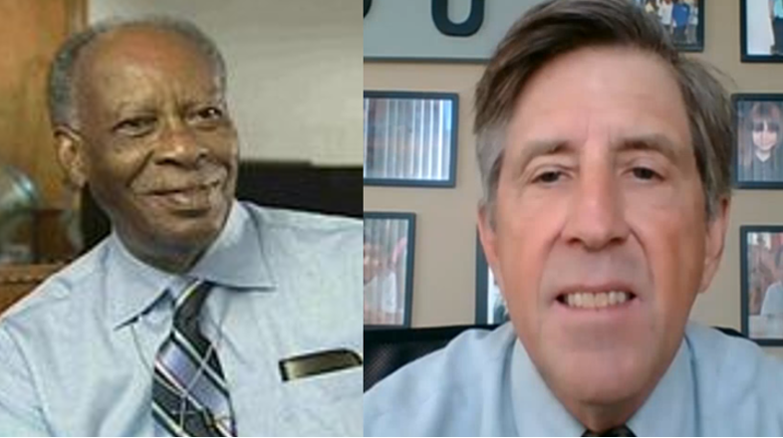 In this episode, Tuthill speaks with the Rev. Hawthorne Konrad (H.K.) Matthews, who was active during the civil rights movement in the Pensacola area and was arrested 35 times for his political activities. Leader of both the local NAACP and the Southern Christian Leadership Conference, Matthews was savagely beaten along with Congressman John Lewis, who died last week at the age of 80, and hundreds of others on March 7, 1965, on the Edmund Pettis Bridge in Selma, Alabama.
In this episode, Tuthill speaks with the Rev. Hawthorne Konrad (H.K.) Matthews, who was active during the civil rights movement in the Pensacola area and was arrested 35 times for his political activities. Leader of both the local NAACP and the Southern Christian Leadership Conference, Matthews was savagely beaten along with Congressman John Lewis, who died last week at the age of 80, and hundreds of others on March 7, 1965, on the Edmund Pettis Bridge in Selma, Alabama.
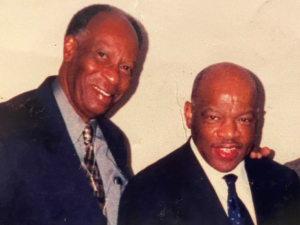
"Lewis suffered a fractured skull," Matthews remembered in an interview last week with the Sinclair Broadcast Group. "I was in the middle of the group, thank God. I only received secondary blows."
Rev. Matthews discusses his relationship with Lewis and the leadership void he fears will ensue with Lewis’ death. He also discusses his time as an outspoken advocate for education choice and as founder of “freedom schools” across northern Florida and the southern United States, an experience that caused him to see the education choice movement as the natural extension of the Civil Rights era.
"I always knew we needed to have freedom of choice, which is why marched and did a lot of things ... If you have a choice, the results of that choice belong to you. You have ownership of it."
EPISODE DETAILS:
LINKS MENTIONED:
RedefinED: Back to the future on a school choice odyssey
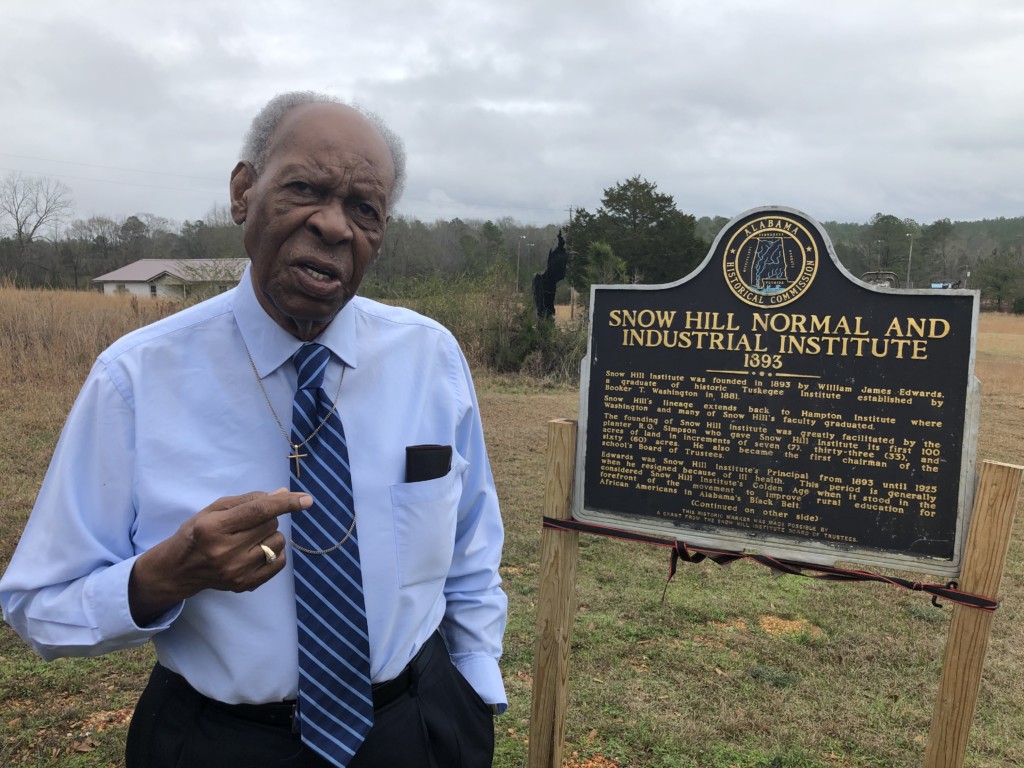
Snow Hill Institute, founded in 1893, educated thousands of students, including H.K. Matthews, before closing in 1973 due to court-ordered desegregation. You can hear Matthews explain the ways in which education choice is an extension of the civil rights movement in a 2013 redefinED podcast at the end of this post.
SNOW HILL, Ala. – There isn’t much left of Snow Hill Institute, an all-black school that once drew thousands of students to this backwoods speck from as far as Mobile and New Orleans. A half-dozen empty buildings, red brick and rotting wood-frame, conjure a century’s worth of ghosts.
H.K. Matthews, class of ’47, unfolds himself from a Camry and is instantly possessed by memories of … a garlic-loving ag teacher named Mr. Brooks. One time, with Mr. Brooks out of the classroom, Matthews and another student started wrestling, inadvertently spilling a bottle of ink on Mr. Brooks’ papers. When Mr. Brooks returned, he whipped them with a leather strap, then, later that day, whipped them twice more.
“I was 17,” Matthews laughed. “Can you imagine a teacher whipping a 17-year-old today?”
Hard to imagine, too, the reign of terror that served as backdrop.
In the 50 years before Matthews was born in 1928, white Alabamians lynched 300 of their black neighbors. When Matthews was 6 years old, a white mob from Florida broke into the jail in Brewton, Ala. – where Matthews now lives – to kidnap and kill Claude Neal, a black man accused of raping and killing a white woman. By the time Matthews and his classmate knocked over that ink bottle, 14 more black men had been lynched in Alabama.
Matthews’ grandmother, who raised him, tried her best to prepare him for this world. So did the school. Sometimes that meant setting high expectations with a strap. Sometimes that meant counseling patience.
“Life is like a revolving wheel,” his grandmother, a teacher, told H.K. on a segregated bus, the first time racism made him cry. “Those who are on top today will be on the bottom tomorrow.”
She and the school drilled the same lessons deep. Faith. Education. Resilience. Self-reliance.
“Whatever I am today,” Matthews said, “my grandmother – and this school – are the responsible parties.”
***
Ramble a half-hour north of the Florida line, past stalky remnants of cotton fields and ramshackle sheds with fresh okra signs. You’ll find the retired Rev. H.K. Matthews in a modest home of trim brown brick. The sign on the front door says, “Southern Charm.” The sign in the yard says, “WE BACK THE FAMILIES OF THE INNOCENT WHO WERE KILLED BY THE BLUE.” It’s a reference to police brutality.
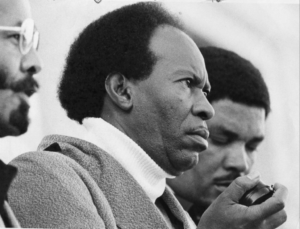
H.K. Matthews, circa 1970
Matthews’ life reads like a Deep South Odyssey. In the 1960s and ‘70s, he was “the Martin Luther King of Pensacola,” an uncompromising leader of both the local NAACP and Southern Christian Leadership Conference. He was beaten at Selma. Arrested nearly 40 times. Twice, he escaped Klansmen waiting to kill him in motel rooms.
Matthews settled in Pensacola after fighting for the Army in Korea. For two decades, he led campaign after campaign to dismantle Jim Crow on the “Redneck Riviera.” He pushed for voting rights, desegregation of lunch counters, better schools for black students. At one point, to get Southern Bell to change its racist hiring practices, Matthews urged every black customer in Pensacola to pay their bills in person – and in pennies. Lickety-split, the company became a little more color blind.
These days, Matthews reaches for his cane if he has to stand too long. But he is still tall, spry, focused, engaged. When he tells any of a thousand stories about being an “agitator,” a smile crinkles the corners of his eyes. When he ends them, he likes to say, “What a ride it’s been!”
The ride continues.
Earlier this month, Matthews joined 150 other black and Hispanic pastors in the Florida Capitol to condemn lawmakers who’d been bullying corporate donors into abandoning the nation’s largest school choice scholarship program. (That program is administered by nonprofits like Step Up For Students, which hosts this blog.) “It’s not social justice,” Matthews said, in comments picked up by national news outlets, “to throw thousands of low-income, mostly black and Hispanic students under the bus.” Three days later, the biggest donor to leave announced it was re-joining.
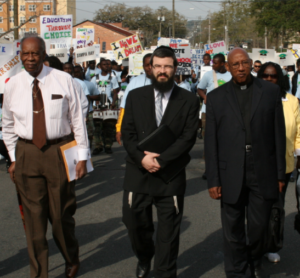
Matthews, left, was among more than 5,000 people who rallied in Tallahassee in 2010 to support school choice.
This wasn’t the first time Matthews spoke out at a critical moment. Ten years ago, 5,000 people marched for school choice in Florida’s capital city – at that time, the biggest choice rally in history. What followed was bipartisan support for legislation that made Florida a national leader in private school choice.
Matthews walked in the front row. And given his own experience with public education in America, it’s no wonder.
***
Snow Hill Institute was founded as a private school in 1893, by Tuskegee Institute graduate William J. Edwards. Its arc parallels the rise of the Rosenwald schools, the 5,000 quasi-public schools, seeded by money from philanthropist Julius Rosenwald, that served as a segregation-era bridge to better schools for black students in the South.
As a condition of his contribution, Rosenwald required black communities to raise the lion’s share of funds for the new schools, and to technically turn the schools over to white public-school districts. The schools were separate by race, unequal in funding. But many were built to cutting-edge architectural designs. They were orders of magnitude better than the sad shacks that passed as public schools for black children. And in an ironic twist, they also often remained in the black communities’ control.
Black teachers. Black principals. Black community decisions over hiring, curriculum, discipline. It’s not hard to find, among Rosenwald alum, a belief that this was a golden age for black education in America.
Rosenwald contributed to Snow Hill Institute. But Edwards (great-grandfather of film director Spike Lee) secured donations from other white Northerners who were the progressives of their day. Within 25 years, what started in a rented log cabin with one teacher, three pupils and 50 cents in savings had become 24 buildings on 1,940 acres, with 400 students and a property value of $125,000, according to a book by Edwards, “Twenty-Five Years in the Black Belt.” Graduates dispersed throughout the South, spreading the gospel of self-determination.
Edwards described the spillover effects in Snow Hill.
Twenty-five years ago the people in the neighborhood of the school did not own more than ten acres of land, while today they own more than twenty thousand acres. Twenty-five years ago the one-room log cabin was the rule, today it is the exception. Twenty-five years ago the majority of the farmers were in heavy debt and mortgaged their crops, today many of the farmers now have bank accounts, while a few years ago they did not know what a bank account was.
After Snow Hill Institute became public in 1924, it continued to educate thousands of students, including Matthews. But in 1973, it closed, due to court-ordered desegregation.
Brown v. Board rightfully ended “separate but equal” in public schools. But for many black communities, it ended community control, too. Black teachers lost their jobs. Black students were sent to white schools that were indifferent, if not hostile. Matthews said the tradeoffs shouldn’t be sugar coated.
“How much was lost to assimilation?” he said on the abandoned campus, as crows cawed in the chill.
“All of it.”
***
The team name for Escambia High was “The Rebels.” The band played “Dixie.” By 1972, the black students who now made up 10 percent of this once-all-white public school in Pensacola were done with the relentless hostility. White students waved Confederate flags. Showed up in Klan hoods. Spray-painted “KKK” on walls. Black leaders took their concerns to the school board, but the board was not responsive.
“Their mood was worse than what we had encountered with other institutions,” Matthews wrote in his 2007 autobiography, “Victory After The Fall,” co-authored with history professor Michael Butler. “They were much more hostile, bitter, and closed to compromise … ”
As fall unfolded, fights broke out, students got arrested, white lawmakers stirred the pot. One of them said to others in a Capitol hallway, in words reported on TV news, “Those n****** make me so mad … If I had anything to do with it, I would get a shotgun – no, a submachine gun – and mow them down.”
In December, the district closed the school because of racial unrest. The NAACP and SCLC followed with a list of demands. If the board didn’t act, the groups said, the community would boycott the schools. Right after New Year’s, that’s what it did.
But black students didn’t stay home.
***
Fewer students attending public schools meant less money for the district and its white employees – and more leverage for progress, Matthews reasoned. At the same time, black parents would not tolerate their children being out of class.
So Matthews organized “freedom schools.”
They were inspired by the schools civil rights activists created during “Freedom Summer” in Mississippi. The SCLC in Pensacola turned to black churches to house them, to retired black teachers for instruction. It worked. Hundreds of black students attended classes in core subjects, with black contributions in history and literature infused into the curriculum. The newspaper blasted the schools. A state senator called for the arrest of black parents (for allegedly abetting truancy). But parents kept dropping their kids off.
The boycott continued until a judge issued a temporary injunction against use of the Confederate flag and “Rebel” nickname at Escambia High. The freedom schools in Pensacola closed. But Matthews started them in three other North Florida towns where black communities battled white school districts.
Years before “school choice” became a thing, Matthews was all in.
***
In December 1974, a white sheriff’s deputy in Pensacola chased down a black motorist, Wendel Blackwell, then shot and killed him from three feet away. According to Matthews’ autobiography, a black woman had been in the car with Blackwell. The deputy had been having an affair with her. A few days later, she was found dead beneath a highway overpass. The deputy was never suspended. The state attorney concluded he acted in self-defense.
Matthews led the protests. But as anger mounted, the sheriff’s department arrested him on a bogus charge of extortion, for allegedly trying to force the sheriff to fire the deputy under threat of violence. An all-white jury found Matthews guilty. He was sentenced to five years in prison. After 63 days, one Florida governor, Reuben Askew, commuted his sentence. Another, Bob Graham, pardoned him. But in the aftermath, Matthews could no longer find work in Pensacola.
“Blackballed?” I asked. “Whiteballed,” he said.
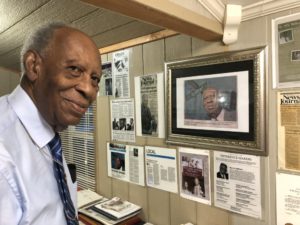
Matthews lives in a modest home of trim brown brick a half-hour north of the Florida line, surrounded by photographs and newspaper clippings documenting his adventurous past.
Matthews returned to Alabama. For 40 years, he served as pastor of Zion Fountain AME Zion Church in Brewton. But he never stopped getting into “good trouble.”
In 2015, he was among many speakers – but the one with the most notoriety – who urged the county commission in Pensacola to cease flying the Confederate flag over government property. On his way home, a truck with Confederate flags flapping began tailing his Altima. It switched lanes when he switched lanes. It followed him into Alabama. Rounding a familiar curve with a side road, Matthews, then 87 years young, cut the lights, turned sharp and checked the rear view. “The truck kept on,” he said.
“What a ride it’s been!”
***
A half-century after integration, 10 schools on Florida’s list of “persistently low-performing” schools are in Pensacola. All 10 are predominantly students of color. Eight are majority black. Decade after decade, community after community, the same sick story plays like a broken record.
Back at Snow Hill, Matthews shook his head. In the darkest of times, black communities scratched out ways to build schools that worked for their children. Today, they have more tools than ever to build more, better, faster.
“Why not another Snow Hill Institute?” Matthews said.
“Why not 1,000 of them?”
In case it isn’t clear, Matthews wasn’t asking.
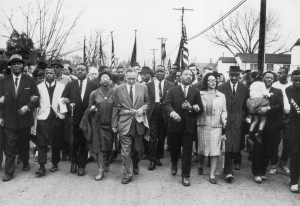
Florida civil right leader H.K. Matthews, who marched at Selma, says both that historic march and the current fight over school choice are about empowerment.
The historic march at Selma in 1965 and the current battle over school choice in Florida have a lot in common, writes Florida civil rights icon H.K. Matthews in an op-ed in today’s Fort Myers News Press.
Matthews participated in the Selma march, which is again the focus of national discussion thanks to a powerful new movie. He also helped lead the 2010 march on Tallahassee that drew nearly 6,000 people in support of tax credit scholarships for low-income children.
Watching the movie revived painful memories, Matthews writes. But it wasn’t the first time he had flashbacks to that pivotal moment in the civil rights movement, pointing specifically to the 2010 rally in Florida.
“Incredibly, nearly 6,000 people showed up — that's roughly 10 times the number who marched across that Selma bridge,” he writes. “Over 1,000 people slept on buses overnight to be there. They came to celebrate their own empowerment — the ability to choose the best school for their children.”

Rev. Matthews participated in both the first Selma march and the 2010 march in Tallahassee that drew nearly 6,000 in support of parental choice. He is in the front row on the left, walking with the cane.
The 2010 march preceded passage of a bill, later signed by then Gov. Charlie Crist, that expanded the scholarship program. Last August, the Florida teachers union, Florida School Boards Association and other groups filed suit to end the program, which is administered by nonprofits such as Step Up For Students, which co-hosts this blog. A key hearing in the case is set for Feb. 9.
“When I heard about the lawsuit, I had another flashback to the old movement,” Matthews writes in the op-ed. “The parallels were striking to me. Here were citizens demanding empowerment. A march symbolized that demand. And here were powerful groups trying to deny it.
“I suppose that this lawsuit will eventually end up in the Florida Supreme Court. One thing I'm fairly sure of: If nearly 6,000 people showed up just to demonstrate that they supported the program, how many will come if the most important thing to them — their right to choose the best school for their children — is threatened to be taken away?”
Read the full op-ed here.
Last month, Rev. H.K. Matthews, a civil rights leader in Florida who marched with Martin Luther King Jr. at Selma, pleaded with Charlie Crist to publicly denounce the lawsuit against the tax credit scholarship program for low-income students. Crist would not do so, but Matthews has not given up his fight against the suit.
In an op-ed in the Tallahassee Democrat, Matthews called the lawsuit filed Aug. 28 by the Florida teachers union, Florida School Boards Association, Florida NAACP and other groups “hard to stomach.”
“The truth is that wealthy children have always had choices, whether to neighborhoods with favored public schools or private schools that only money can buy,” Matthews wrote. “The union cries foul when that privilege is extended to those of meager financial means.”
Matthews is part of a politically diverse coalition opposed to the lawsuit that includes a number of prominent black ministers like himself. Nearly 70,000 students are being served by the program this year, more than two-thirds of them black and Hispanic. The program is administered by nonprofits like Step Up For Students, which co-hosts this blog.
In the op-ed, Matthew said he and other school choice supporters are not knocking public schools, calling them “the lifeblood of education.” “But the world is changing, and education needs to change as well,” he continued, noting the proliferation of other school choice options, including magnet schools, charter schools, virtual courses and career academies.
“The scholarship is not an educational miracle,” he concluded. “It’s simply an option that can work for some students but not all. The fact that it grants opportunities to economically disadvantaged students and those of color is something that gives hope to an old civil rights warrior like me.” Read the full post here.
From the News Service of Florida:
In a move that highlights the political crosscurrents confronting Democrats on education issues, a coalition emphasizing the benefits of state-approved vouchers for low-income students called Wednesday for the Florida Education Association to drop a lawsuit challenging the program.
The Save Our Scholarships Coalition, which held a conference call with reporters to draw attention to the request, consists largely of African-American, Hispanic and Jewish leaders --- some of whom have constituents who are parts of key Democratic voting blocs in Florida. But the coalition is at odds with the state's largest teachers union, which often provides resources and organizational muscle for Democratic candidates.
The coalition's leaders are not exclusively Democrats by any means. For example, Julio Fuentes, head of the Florida Hispanic Chamber of Commerce and the Hispanic Council for Reform and Educational Options, often supports Republican causes and candidates.
But in remarks on the conference call Wednesday, he underscored the demographics of those who receive the 68,000 awards from the Florida Tax Credit Scholarship Program, as the voucher system is formally known,
"Many of these children are minorities and come from economically disadvantaged families," Fuentes said. "We have an army of motivated educators who are willing to roll up their sleeves and be part of the solution."
H.K. Matthews, a civil-rights leader, also joined the call to question the motives of Florida Education Association leaders fighting to undermine the program.
"I cannot for the life of me fathom why these educators are willing to jeopardize the well-being of the state's poorest students," Matthews said.
At the same time, the lawsuit filed in August to challenge the voucher program is supported by the Florida NAACP and a Jewish rabbi --- highlighting the complicated fissures within Democratic voting blocs over the tax-credit system.
The lawsuit says the $357.8 million program, which provides tax credits to companies that donate money to nonprofit entities that pay for children to go to private schools, violates constitutional limits on aid to religious institutions and the Legislature's responsibility to fund public education.
Without the scholarship program, the tax dollars businesses would otherwise owe the state could be used to help fund public education, voucher critics say.
Joanne McCall, vice president of the FEA, said Wednesday that her group didn't intend to back away from its lawsuit. She said lawmakers should instead provide the support necessary to build up the state's public schools.
"If they did all of those things, there would be no need to have any kind of scholarship programs," McCall said.
The dispute comes at an awkward time for Democrats, who are trying to beat incumbent Republican Gov. Rick Scott in next month's election. Scott wasted no time in flaying the FEA lawsuit when it was filed, but Democratic candidate Charlie Crist --- a former Republican governor who later became a Democrat --- has been more cautious about the program.
The section on Crist's website devoted to education policy doesn't address the voucher program beyond a promise that, if elected, Crist would "ensure that corporations receive the same tax incentives for investing in Florida's public schools as they do for investing in private schools." The Crist campaign did not respond to a question Wednesday about whether he believed the FEA should drop its lawsuit. (more…)
What would Dr. Martin Luther King Jr. say today about our schools? What approaches would he support to close achievement gaps? What would he think of school choice?
Over the past year, we asked a number of folks to weigh in on those questions. For a podcast last January, we asked the Rev. H.K. Matthews, a civil rights icon in west Florida who knew Dr. King. We asked others for a blog series that ran last August, on the 50th anniversary of Dr. King's "I Have A Dream" speech.
As we celebrate MLK Day today, we thought it appropriate to highlight those posts. We know there are no easy answers, but we hope these voices contribute thoughtfully to the debate.
From H.K. Matthews: School choice: an extension of the civil rights movement
From Darrell Allison, president of Parents for Educational Freedom in North Carolina: Access denied, from lunch counters to zip codes
From John E. Coons, longtime school choice advocate: MLK and God's schools
From Vernard T. Gant, director of urban school services with the Association of Christian Schools International: The unrealized dream of educational justice
From Peter H. Hanley, executive director, American Center for School Choice: Parental choice would honor The Dream
The Rev. H.K. Matthews, 84, was beaten by white police in Selma, jailed more than 35 times and blacklisted from jobs for not backing down. So when he says expanding school choice and civil rights go hand in hand, his words carry the weight of someone who's been there. The west Florida icon sees no inconsistency in an agenda that puts support for vouchers, tax credit scholarships and charter schools on the same list as protesting police brutality, integrating lunch counters and ensuring equal opportunity in the work place.
“It has always been my contention that if a parent felt that his or her or their child was not being adequately educated in one school in the public school system, that they should have the opportunity or the choice of moving that child to a school where it would be more beneficial,” Matthews said in the redefinED podcast attached below. “If you’re being forced to keep your child in a school where he or she is not learning, that is doing nothing but crippling that child.”
As the nation pauses today to celebrate Martin Luther King Jr., we thought redefinED readers and listeners should hear from Matthews. Now living in Alabama, he is a diehard for Florida’s tax credit scholarship program and Step Up For Students, which administers the program and co-hosts this blog. In 2010, when more than 5,000 students and parents marched in Tallahassee for an expansion of the program, Matthews was in the front row.

Rev. Matthews was among more than 5,000 people who rallied in Tallahassee in 2010 to support school choice. He's in the front row on the left, walking with a cane.
He remains an activist for other causes, too. Last month, he participated in a "rally for justice" stemming from the controversial arrest of a 27-year-old mom in a Wal-Mart. And in 2011, members of the Occupy movement asked him for advice. They gathered around him as he offered this nugget: “They said I was an agitator. But if you look at a washing machine, it’s the agitator in the middle that gets all the dirt out.”
Here are some highlights from the podcast:
On what Dr. King might think of school choice: “Knowing him as I knew him, and knowing his desire and his fire for people having a right to choose, my feeling is he would support school choice. Because he was always for the rights of individuals. Not barring any particular race, not barring any particular origin or religion. But he just felt that people should have a right, I think, to be free, to express themselves, and to go where they wanted to go. And to go to places that would be more beneficial to them.” (more…)
While defending his sponsorship of Pennsylvania’s proposed Opportunity Scholarship, state Sen. Anthony Hardy Williams has been known to draw parallels between opponents to school choice and the demagogues who blocked the advance of the civil rights movement. But there have been an increasing number of critics who blanch at the analogies, most recently from Kevin Ferris at The Philadelphia Inquirer. Ferris acknowledges that “education is indeed a civil right” and he supports the educational options that would result from the Opportunity Scholarship. “But voucher opponent does not equal Klansmen,” he writes.
That may be a harsh indictment of Williams, who hardly appears ready to adorn his political adversaries with a white hood, but it raises a fair question in our discourse over education reform: Is it appropriate to resurrect the history of the civil rights movement and relate its struggles to today’s effort to establish more educational alternatives for disadvantaged children?
The name of the Rev. H.K. Matthews may not be as familiar as the Rev. Martin Luther King Jr. in history books, but Reverend Matthews is well known in the Southeastern United States as a pioneer in the movement who led the first sit-in demonstrations at segregated lunch counters in the Florida panhandle and was jailed 35 times during the process. He also marched with Dr. King at Selma, and his achievements have been celebrated and his life story chronicled in the biography Victory After The Fall. But for the past several years, Matthews, who’s now 83, has been active in the cause for school choice for low-income children, calling the effort “a natural extension of the civil rights movement.” (more…)